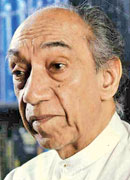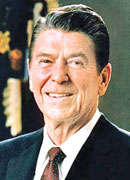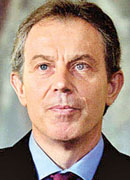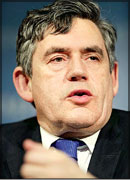A probe to heal the wounds of war
 J R Jayewardene is best remembered, both in Sri
Lanka and abroad, for the contribution he made to the San Francisco
Conference which produced the Treaty that ended the war between the
Allied Forces and Japan. J R Jayewardene is best remembered, both in Sri
Lanka and abroad, for the contribution he made to the San Francisco
Conference which produced the Treaty that ended the war between the
Allied Forces and Japan.
Known widely as the San Francisco Conference, at this meeting of
nations held in September 1951, it is accepted that JR Jayewardene
representing what was then Ceylon, played a major role in admitting
Japan back into the world community, after the enmities of war.
President JR Jayewardene himself recalled his role at San Francisco
when he met President Ronald Reagan as the guest of the US President in
June 1984. Referring to his earlier visit to the San Francisco
Conference President Jayewardene said: “...the thinking of the people of
my country, which was expressed by me on that occasion, was that we
should not ask for reparations from a fallen foe who had harmed our land
and people also; that we should forgive those who were our enemies,
quoting the words of the Buddha that “hatred ceases not by hatred, but
by love,” which you, also, Mr. President, just quoted. I pleaded that we
should restore to Japan the freedoms of democracy. Those were the ideals
which inspired us then and inspire us now.”
|

J R Jayewardene |

Ronald Reagan |
|

Tony Blair |

Gordon Brown |
“Our history and civilization have survived in an unbroken sequence
from the fifth Century B.C. for 2,500 years. There were glimpses of
modern democracy even then, as in the appointment of mayors to our
ancient cities. The ruins of State buildings still contain carvings in
stone where the Cabinet of the kings and their ministers sat.
We were the first in Asia in 1865 to select members to the
municipalities that governed our major cities and, in 1931, under
universal franchise, to exercise our right to elect the government of
our choice,” he said.
Chilcot Inquiry
There is no doubt that the very good relations that Japan has with
Sri Lanka owes much to what was then the surprising attitude of a
post-colonial and pro-Western Ceylon, expressed by JR Jayewardene. The
reference to this event has relevance today, in view of the steps being
taken by the Government to establish a ‘Lessons Learnt and
Reconciliation Commission’ which has now been passed by the Cabinet, and
will soon be named, and begin functioning.
There are some who are already critical of this move, describing it
as one more example of Sri Lanka setting up committees when faced with
issues that need solution. After all it was the Truth and Reconciliation
Commission that helped South Africa overcome much of the painful results
of apartheid and move towards the democracy it now is; where a youth
leader of the African National Union is being tried for the murder of a
leader of the white supremacists who remained supportive of the policies
of apartheid.
One wonders what such critics, both in Sri Lanka, will have to say of
the Chilcot Inquiry into the United Kingdom’s role in the invasion of
Iraq in 2003, with the USA. This inquiry is now proceeding and among the
high profile witnesses that came before it were former Prime Minister
Tony Blair and later Gordon Brown, who gave evidence as Prime Minister
about the role he played as the Chancellor of the Exchequer at the time
the invasion was launched and continued it as Prime Minister. Is there a
word about war crimes in that probe, and will there be any such demand
for such a probe about US drones and Pakistan vis-a-vis Afghanistan?
Process of healing
There are also voices heard criticizing that the Lessons Learnt and
Reconciliation Commission will not be a War Crimes Commission. These are
critics who have largely concluded that the Sri Lankan Security Forces
did indeed commit war crimes, and have steadfastly maintained this
position, with hardly any evidence to support their charges; except for
the familiar voices of the pro-LTTE expatiates in Western countries, who
falsely label themselves as the Tamil Diaspora.
In his address to the Diplomatic Corps in Colombo earlier this week,
where President Rajapaksa made it abundantly clear that what was sought
was not retributive justice, but rather restorative justice. The aim is
the search for reconciliatory justice that can help heal the many wounds
of war.
What Sri Lanka needs today is not the continuance of pain, but a
process of healing, that will prevent the recurrence of the situations
that led to the prolonged conflict; especially the surge of the battle
by the LTTE that was seen after it used the opportunities for peace
provided by the Ceasefire Agreement of 2002, to carry out more
intensified onslaughts on the Security Forces and the public in all
parts of the country.
The results of two elections have shown that people of the areas once
dominated by the LTTE are keen to join the process of nation
re-building. It is the healing of the wounds of war that will help bring
new feelings of brotherhood and understanding among sections of the
people. One significant feature of the new inquiry will be to see where
the accepted norms of behaviour in conflict situations within a country
have been violated, which will go a long way in identifying those
responsible and also the manner in which they are to be dealt with.
Another important aspect, of which little notice has been taken by those
who lament the absence of a war crimes probe, is the decision of the
government to compensate those who have suffered from the conflict.
These are two major initiatives that should go a long way in
strengthening the process of reconciliation, which is the core purpose
of this exercise.
Those who demand a war crimes probe are markedly silent about the
LTTE’s holding of more than 300,000 civilians as human shields in the
final months of the battle, which has been acknowledged by international
observers, and should amount to a serious war crime in any assessment.
What we need is reconciliation with those victims of the LTTE’s terror
as well as those who suffered from military operations.
Cultural relations
Just as J R Jayewardene said at San Francisco, what is needed is not
to take revenge from those who caused so much harm and damage to our
country, and other countries. Rather it was to see how there could be a
restoration of peace, in the context of the historical and cultural
relations that had remained strong for centuries, but were painfully
disrupted by the war. That is why Ceylon was loud in opposition to
reparations from Japan. What was then sought by Ceylon was not
retributive justice. But justice that brings about peace and
understanding among people.
It is the principle of renouncing hatred in favour of love, tolerance
and understanding that makes us seek restorative justice today, in place
of the retributive justice sought by those who call for a war crimes
commission. Having gone through such painful conflict through nearly
three decades, the important lesson is that reconciliation comes through
learning and understanding, and not through retribution. |



